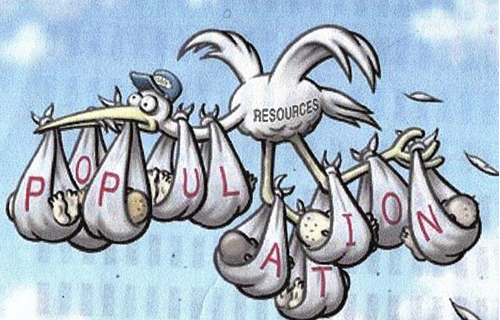What is World Overpopulation?
July 11th is the annual World Population Day, by the United Nations to highlight the impacts of overpopulation on people and the environment. Governments, universities and public-interest groups the world over hold educational forums and other events to stress the need to stabilize human numbers.
The world’s population reached seven billion at the turn of 2011-12. Thoughts that the world is overpopulated have been increasing. That’s mainly caused both by the persistent rise in the number of people and by concerns about climate change and strain on resources.
Historical Figures
Some quick figures.
Human population took approximately 250,000 years to reach 1 billion (in the early 19th century).
More than a century passed before it reached 2 billion (in 1927).
Yet, the next billion took only 33 years (1927-60).
The one after that, 14 years.
The following two stages, to 5 billion and then 6 billion, took 13 and 12 years, in that order.
However, the increase from 6 billion to 7 billion will be the last to happen in such a short space of time.
The next billion will take slightly longer – 13 or 14 years – and the billion after that, which raises the population to 9 billion, will take 20 to 25 years.
By that time, around 2050, the momentum will be slowing towards zero. Also, the world will be hopefully approaching a roughly stable population for the first time in centuries.
The epoch of shortening time lapses is by now over, even if the absolute size of the population is still on the rise. Momentum matters massively in demography. Large families in an earlier generation equal more mothers in the current one and hence more children. Even if families are smaller and the fundamental drive towards growth has dwindled.
It takes another generation before the upshot of smaller families, starts to show up in the general population figures. The total size of the population has gone on rising. It still reflects the momentum of the 1960s and 1970s or the baby-boom period in America and Europe. Also, we have seen very high birth rates in developing countries.
Sustainability of World Overpopulation
How could 9 or even 7 billion be sustainable? The linkages between overpopulation and climate change are often complex. Yet, with overpopulation, economies and consumption outpace the Earth’s capacity to adjust, and climate change could become dramatic.
People say the world would soon require an extra planet if it continues gobbling up resources as it does now. World overpopulation either partially caused or exacerbated a variety of environmental challenges. We are already well into overshoot of the planet’s capacity to sustain us.
“Trends such as the loss of half of the planet’s forests, the depletion of most of its major fisheries, and the alteration of its atmosphere and climate are closely related to the fact that human population expanded from mere millions in prehistoric times to over six billion today,” says Robert Engelman of Population Action International.
According to Population Connection, population growth since 1950 is the cause for:
- the clearing of 80 percent of rainforest,
- the loss of tens of thousands of species,
- an increase in greenhouse gas emissions of some 400 percent and
- the expansion or commercialization of as much as half of the Earth’s surface land.
Also, heavy-consumption lifestyle drains resources at an alarming rate. The USA for example represents 4 percent of the world’s population but accounts for 25% of the overall consumption.
Click to enlarge
Solutions to World Overpopulation
Access to contraception, support to family planning, taxes, a revolution?
We checked the Global demographic trends and future carbon emissions paper by Proceedings of the National Academy of Sciences of the USA. Speedier economic development is not the only factor, or a necessary one, in aiding population decline. Policies can also considerably influence fertility trends.
The suitability of policies that hearten even lower fertility in countries where it is already low is contentious. It would require reflection over the trade-offs related to increased aging.
According to the movement Global Population Speakout, powerful taboos remain when it comes to speaking about world overpopulation. Vested interests, both fiscal and ideological, prefer it when population discussions remain hot and off-limits.
Let’s use this day, World Population Day, as a chance to discuss solutions to challenge. Universal access to birth control and family planning are critical to empower women and provide them with needed resources to help them make important decisions.
Check out our articles on My Antarctic Expedition, March 2016, Global Warming: Undeniable, The Brutal Climate Change Logic

